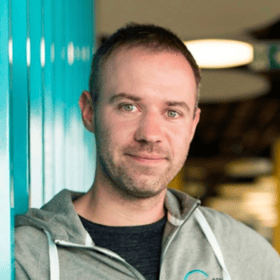What is a startup?
Startup here, startup there, startup everywhere! What does the word startup actually mean? And what is typical for startups? Let's check it out together!

Our definition of a startup
Here at StartupJobs, not only startups advertise, but also large e-commerce and online companies, so it may be a little more difficult to find out what a startup actually is - and what it isn't.
Definitions vary, so we’ve decided to come up with our own. At StartupJobs, we consider startups to be companies, which meet the following criteria:
 Rapid growthStartups grow by more than 25% per year on key metrics. Whether it's revenue, the number of users or any other important metric.orSearching for product-market fitThese are companies in the early stages of their creation. These startups are looking for their place on the market and are trying to validate their ideas and business model.
Rapid growthStartups grow by more than 25% per year on key metrics. Whether it's revenue, the number of users or any other important metric.orSearching for product-market fitThese are companies in the early stages of their creation. These startups are looking for their place on the market and are trying to validate their ideas and business model. Company culture of moving forwardCompanies that come to the market with courage and new solutions, want to move forward quickly. Have global ambitions.
Company culture of moving forwardCompanies that come to the market with courage and new solutions, want to move forward quickly. Have global ambitions. Age of the companyThe company was founded less than ten years ago.
Age of the companyThe company was founded less than ten years ago.
Do you meet this definition?We offer Startup program membership to companies that meet our definition of a startup. The program offers more favorable conditions for advertising and promotion compared to other companies.
If you are wondering which company can still be included in the "startup" category, or if our definition sounds a bit too general to you, let’s look at a few concrete examples of what is NOT a startup from our point of view:
Startups aren't
- A newly opened confectionery on the town squareWe definitely have nothing against cakes or cream rolls, but the fact that the pastry shop is newly opened does not make it a startup. Desserts and sweets are offered in a pastry shop in the neighboring district and in a café two streets away.
- An insurance company with several thousand employees, …sister company of a corporate entity, recruitment agency, real estate agency, headhunter or consultant. All of the aforementioned certainly have their place in the labor market, but they cannot be considered a startup. As a rule of thumb, they don't bring innovations to the market and their goal isn’t to bring new solutions.
- A company with new offices where everyone is on a first name basisIt's really not that simple. A pleasant working environment is typical for startups, but just being informal, adjustable tables or a relaxation zone don’t make you a startup.
Is it any clearer now?
Let's discuss startups a little more specifically:
 Fast growthA startup is a fast-growing, often technology-focused business that has a big vision and ambition to change a specific industry or area. Rapid growth is the main characteristic of a startup.
Fast growthA startup is a fast-growing, often technology-focused business that has a big vision and ambition to change a specific industry or area. Rapid growth is the main characteristic of a startup. Small teamAs a rule of thumb, a relatively small team of people works in a startup, who, moreover, often change positions within the company, due to the dynamics of growth and changes.
Small teamAs a rule of thumb, a relatively small team of people works in a startup, who, moreover, often change positions within the company, due to the dynamics of growth and changes. Low costsWhen launching a business and subsequent growth, startups try to keep costs as low as possible and ensure the shortest possible return on investment.
Low costsWhen launching a business and subsequent growth, startups try to keep costs as low as possible and ensure the shortest possible return on investment. RiskThe goal of a startup is to grow into a stable and prosperous company. Due to rapid growth, however, startups are associated with a relatively large business risk, and many of them end in failure.
RiskThe goal of a startup is to grow into a stable and prosperous company. Due to rapid growth, however, startups are associated with a relatively large business risk, and many of them end in failure. UnicornsDue to the high mortality rate of startups, the most successful ones are called "unicorns". Those are the startups whose market value has exceeded a billion dollars.
UnicornsDue to the high mortality rate of startups, the most successful ones are called "unicorns". Those are the startups whose market value has exceeded a billion dollars.
- Early StageThe establishment of a startup is preceded by an initial business idea. And that is also the first phase of the "life cycle" of a startup, which is called the "Early Stage". The future success of a startup depends mainly on great execution and finding the right scalable model.
- Seed StageThe "Early Stage" is followed by the phase when the company is officially established and seeks funds to enter the market. The financing of startups is often sponsored by investors, startups typically get funding for their initial costs from crowdfunding or startup accelerators and incubators. However, a number of startups also operate without external funding. This phase of the startup, when the company seeks financing, is referred to as "Seed".
- Growth StageAfter obtaining funding, a startup enters the market with one goal - to grow into a prosperous company as quickly as possible. It is therefore no surprise that this phase is called "Growth".
- What next?In the last stage, the startup already has a stable structure and is working on further growth and expansion. If it is successful, its startup journey ends the moment it fulfills its original vision. Prosperous startups often end up being bought out by another company.
How is working in a startup?
Startups are famous for their friendly atmosphere and informal environment. Thanks to their rapid growth, a person can learn in a month what would take a year elsewhere. And on top of that, he will be doing meaningful work that he will enjoy. So what’s typical working for a startup?
 Informal environmentSleek dress codes, endless meetings and polite phrases - that’s exactly what you won't find in a startup. At a startup, clothes don’t matter, meetings are over in a few minutes, and new ideas are discussed at any time.
Informal environmentSleek dress codes, endless meetings and polite phrases - that’s exactly what you won't find in a startup. At a startup, clothes don’t matter, meetings are over in a few minutes, and new ideas are discussed at any time. Speed of implementationIn a startup, ideas turn into reality right before your eyes. You won't be working on something that ends up in the trash. On the contrary - you’ll very quickly see that your work can really make a difference.
Speed of implementationIn a startup, ideas turn into reality right before your eyes. You won't be working on something that ends up in the trash. On the contrary - you’ll very quickly see that your work can really make a difference. InnovationIn a startup, you’ll be involved in the introduction of innovations and be in constant contact with the cutting edge technology. You’ll often decide for yourself, which innovations make sense for your company. That way, you won't come across any archaic procedures nor technologies that would hold you back in your work.
InnovationIn a startup, you’ll be involved in the introduction of innovations and be in constant contact with the cutting edge technology. You’ll often decide for yourself, which innovations make sense for your company. That way, you won't come across any archaic procedures nor technologies that would hold you back in your work. Friendly atmospherePeople make the company, and this is doubly true for startups! In a startup, you’ll not only find colleagues in the team, but also friends with whom you'll want to spend time with outside of work. And this applies to all team members - from the intern to the boss. Hierarchy isn’t important in startups.
Friendly atmospherePeople make the company, and this is doubly true for startups! In a startup, you’ll not only find colleagues in the team, but also friends with whom you'll want to spend time with outside of work. And this applies to all team members - from the intern to the boss. Hierarchy isn’t important in startups.
So what are you waiting for? Find a job at a startup to level up!
They moved with us
- "On an academic level, I would say that a startup is a label for a company until it finds a product-market fit, i.e. until it gets the unit economics to become scalable.”

Hubert Palán
Productboard
- "A startup is a company that is wanted. The two essential parameters are time and uncertainty: "Will we manage to find a functional business model before we run out of money?" The moment the company can earn money for itself and for its growth, then in my opinion it is no longer a startup."

Oliver Dlouhý
Kiwi.com
- "For me, a startup is a company that can grow quickly thanks to an innovative approach, disrupts the established order, takes a new, bold approach, proceeds iteratively, and learns."

Milan Zemánek
Miton
- "I perceive a startup as a company that is a startup primarily "in spirit", i.e. it is a company set up (internally, by culture, plans...) for rapid development, rapid changes, ideally for rapid growth, and it is a company that maintains its internal ("startup") culture - i.e. the attitude to change, to constantly search for new procedures and ways of doing things. It can have three people or 3 000, a million or ten billion in revenue, if it meets these criteria, it's a startup for me."

Jiří Hlavenka
- "For me, a startup is a company based primarily on technology that has the potential and goal to grow quickly, to disrupt the existing market or players operating in them, its product/service should be exponentially scalable."

Tomáš Ditrych
Mavericks
- "For me personally, these are companies that meet the following criteria: They are less than 10 years old, rapidly growing in revenue and number of users (ideally hundreds of percent per year), from the field of new economy (typically tech), expand (especially geographically). However, many other criteria could certainly be found."

Michael Mareš
Hospodářské noviny
- "Based on my perception, I would define a startup as a new company, i.e. not a spin-off of a larger company or a rebranding of an older company. International, ideally global ambitions in their field. Solves an existing problem with a new approach, or disrupts the market, or comes up with new solutions. Max. up to approx. seven years of age, of course this can be adjusted, but I find the aspect of the age of the company more interesting than, for example, the size of turnover, etc. A company focused on innovation."

Jiří Sauer
Deloitte
- "For me, a startup is a fast-growing business or a business with the potential for rapid growth (scaling). Growth is what makes a startup."

Vojtěch Roček
Presto Ventures
- "A startup is a mix of approach to work, size and age of the company and ambitions for growth."

Ondřej Fryc
Reflex Capital
- "We’ve tried several times to look for a definition with clients and have never found it. For me, a startup is always a company that deviates from the traditional business paradigm. Approaches problems from an innovative perspective (aka it's simply not just a company with a startup mindset). Is built on technology - meaning SW development. Simply, development is one of its key aspects. The concept always struggles with audience acceptance. Growth is important to it, that's why it burns money - whether from investors or from a parent company."

Honza Husták
HustáKomunikejšn
Item 1 of 10
We upgrade startups!